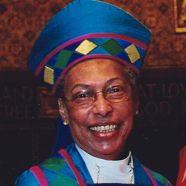Interview with the Rt. Rev. Barbara C. Harris
The Rt. Rev. Barbara C. Harris is the first woman to become a bishop within the worldwide Anglican Communion (in the United States, it is termed the Episcopal Church) and is well-known as a person whose passion for justice is unrelenting, not only for women and for minorities, but for all of the problems that the Church has to face. South Writ Large had an opportunity to communicate with her this month.
We just came through an election that had the potential for the first female president of the United States. Please share something of your personal perspective regarding the struggle for women’s rights.
The struggle for women’s rights continues and would not have ended had we elected the first female president of this country. That struggle includes equal pay for equal work (I remember when I served as manager of a department in a major corporation and was paid less than my male counterparts. I would hazard a guess similar situations still obtain in some workplaces); access to vital health care screening as provided by such facilities as Planned Parenthood, under siege in many communities; and inequities in other areas such as the military.
You go back all the way to the struggles in the Mississippi Delta in the 1960s helping African American voters register to vote. Will you please update us on the continuing struggle for voting rights from your perspective?
Voter suppression of African Americans, while different today than in the 1960s, is pervasive and requires continued efforts to ensure that all eligible citizens, particularly the elderly and those in rural and underdeveloped communities, have access to proper voter identification and polling facilities.
What was it like to participate in the march from Selma to Montgomery, at the time and as you look back?
While I participated in only the final portion of the Selma to Montgomery March, it was both an exhilarating and frightening experience to be a part of such a history-making event that had a tremendous impact on the struggle for human rights, not only in the South, but throughout the country. My memories of that experience, not all pleasant, are still very vivid, and I am thankful I was able to participate.
Who were some of your heroes, including those you admired growing up?
Growing up my heroes and heroines included my grandmothers, Harriet Tubman, Sojourner Truth, and later my clergy, Dr. Martin Luther King, and others who fought for equal rights and human dignity.
What were some of the hurdles you overcame to become, and then to serve as, the first female bishop?
There were many hurdles to becoming the first woman bishop in the Episcopal Church and the Anglican Communion, including the firm conviction of many sincere and devout clergy and laity that it was not God’s will that women should or could fulfill leadership roles in the church. There were also unfounded questions concerning my qualifications for the office, my political views, and my sexuality.
What were some of the joys of serving as a bishop?
Some of the joys of serving as a bishop continue even in retirement. These include the opportunity to interact with large numbers of Christians and members of other faith communities in the struggle for social justice, human rights, and the protection and preservation of the environment. I particularly enjoyed and still enjoy administering some of the Church’s sacraments and the opportunity to share my gift for preaching with large numbers of people. The latter opportunity has been afforded me at home and abroad in the Episcopal Church across the country, in Anglican bodies abroad, in other denominations and faith groups, including two synagogues and before an assembly of the World Council of Churches.
What are the fights that we must continue to engage in order to overcome?
I believe the struggle for human rights and dignity and against poverty and need at home and abroad are struggles in which we must continue to engage if, indeed, we are to overcome someday.
What is one of the things you are most proud of or thankful for?
I am most proud and thankful for the opportunity to serve with and for the people of God over many years and the strength and ability to do so even well into my eighty-sixth year of life.







